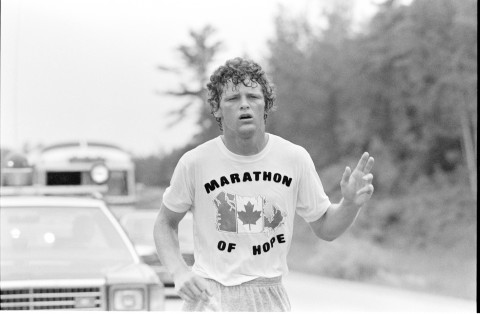In sixth grade I joined something called the “Fitness Club” at my elementary school. There was a cute girl involved, as I recall, and that provided enough of a reason as any to get involved at age 11. One of our first projects was to promote the annual Terry Fox Run in our neighbourhood. That was my first introduction to Canada’s most beloved runner and cancer advocate. With a little research I was quickly fascinated by his tenacity and stubbornness. Canada was so big! (It still is…) And he was going to run all the way across it? On an artificial leg? It just seemed too incredible to be real. I wasn’t born when Terry Fox ran his Marathon of Hope. But he represents something so significant in Canada’s sporting history, that young kids today still know his name and recognize his accomplishments. He left such an inspirational legacy, for cancer patients and survivors, for runners, for every Canadian. He was a pioneer in a way; one of the very first true athlete ambassadors – now almost every pro athlete has a foundation or a charity they work with.
When I think back to when I first became excited about sports, I’m reminded that I was a bit of a late-bloomer. I wasn’t a competitive athlete as a kid, I didn’t really watch sports on TV. My dad would bring my brother and I to an Argos game, but I recall being more interested in the SkyDome’s retractable roof and how many more litres of water went down all the toilets with one flush than over the Niagara Falls in two minutes. A few years later I wandered into the Burloak Canoe Club in Oakville, expecting to try a new sport. I wanted to be the best at something, and since there weren’t any other kayakers in my class, I suppose I was taking the easy route to accomplishing that goal. It didn’t take long before I found further inspiration among the ranks of the Oldershaw clan and Olympic Gold medalist, Larry Cain on the 16 Mile Creek, and started to set some long-term goals.
After competing at the Olympics in 2004 I went back to school full-time at McMaster University. I was 22 and anxious to get back to school after taking a year to concentrate solely on my preparation for the Olympics. A day before my first final exam in December, I got a phone call from my coach. He told me I’d won the Lou Marsh Award, as Canada’s athlete of the year for 2004, for winning gold and bronze in Athens. I was expected to do some TV and radio the next day, which was exciting, but what about my exams?
Thankfully my professors appreciated my situation and let me write my exams after my interviews. But amidst all that studying, I had some other research to take care of. As I said, I wasn’t a huge sports fan. I recalled that Mike Weir won the Lou Marsh the year before and I knew that Wayne Gretzky certainly had as well. But I didn’t know who Lou Marsh was, or what an amazing honour it was at the time.
As I read the other names of the Lou Marsh Award recipients I saw a lot of very familiar ones; The Great One was on there four times, fellow kayaker Caroline Brunet won in 1999 and I remembered that Donovan Bailey and Mark Tewksbury had also won the prestigious prize.
But one name stood out among all the others. 1980 — Terry Fox. I was so struck by emotion at the idea of having my name on a trophy alongside Terry Fox’s that I couldn’t do anything except cry. It was too surreal. He wasn’t like me, he was a legend. He didn’t try to paddle a little boat or score goals, he tried to change the world. He was so much more than just an athlete, way more than a winner. Terry lost his fight with cancer, but he won a much greater battle. The Terry Fox Foundation has raised over $600 million for cancer research in Canada, creating a legacy or giving that will live on in perpetuity.
If Terry’s story can teach us anything, it’s that sport, and the people who do it, can truly create positive change. Sport isn’t just about medals and records and victory. It highlights real human stories, creates awareness, inspires us to dream and believe in ourselves and those around us. Terry was maybe the first athlete who advocated for a cause greater than his own campaign to win. Terry paved the way for people who do sports to be more than just athletes.
Terry challenged the notion of disability, he wanted people to hear his message, so he set out to do something that nobody thought was possible. He said: “I just wish people would realize that anything is possible if you try. Dreams are made if people try.” I hope that as Canadians we continue to have the guts to dream as hard as Terry did. I hope kids hear about who Terry was and why he did what he did, and I hope that inspires them to set goals of their own and to be champions at whatever inspires them. Not just the kind of champion that crosses the finish line first or scores the winning goal – but the kind that Terry was, and continues to be, for us all.
Adam van Koeverden is a four-time Olympic medalist, including gold at the 2004 summer games. The current kayak world champion in the K-1000 metre sprint, Koeverden is a contributor to iRun.






 Current Issue
Current Issue Previous Issue
Previous Issue Prior Release
Prior Release

Thank you for your inspirational story! I will definitely share it with my personal training clients in Chicago!